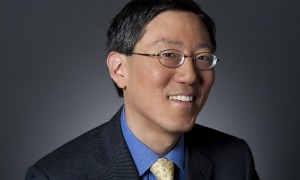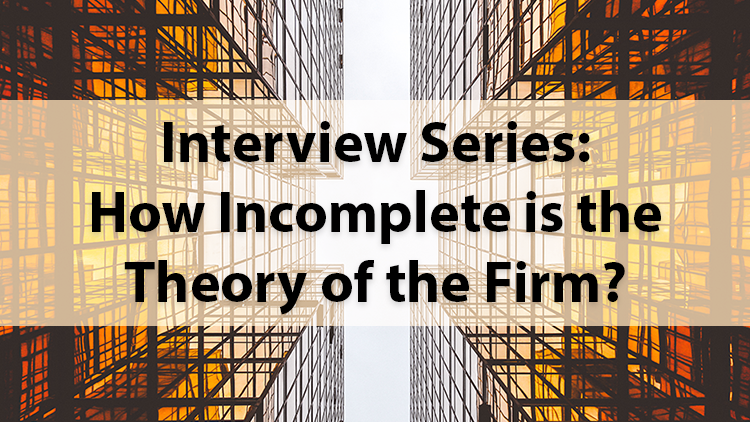In this installment of ProMarket’s new interview series on the economic theory of the firm, we ask University of Connecticut law professor and blogger James Kwak if the existing theory should be modified. “Corporations tend to favor policies that allow greater concentration and reduce constraints on their behavior.”
On March 3-4, the Stigler Center at the University of Chicago Booth School of Business, along with Harvard Business School and Oxford University, will host a conference in Chicago to answer the following questions: Should the economic theory of the firm be modified? And if so, how?
The standard (economic) theory of the firm is silent on the role firms can play in shaping the rules of the game under which they operate. In reality, many firms lobby politicians and try to capture regulators in order to modify the rules of the game in their favor. Some scholars have argued that the resources devoted to these activities are relatively so small that they are likely to have insignificant effects, and/or that regardless of how much firms invest in political activities, in a well-functioning democracy there are countervailing forces that effectively level the playing field. Other scholars have noted that the resources firms devote to shaping the rules of the game to their own advantage are sufficiently large and their effects sufficiently important to warrant a rethinking of the standard economic theory of the firm. Which of these two views has more empirical support? If the latter, should the economic theory of the firm be modified? If so, how, and is the potential fix better or worse than the existing problem?
The following interview with University of Connecticut law professor James Kwak is part of an interview series with influential scholars who are addressing these issues in their work. You can view all previous installments here.

James Kwak is an associate professor of law at the University of Connecticut and a prolific writer and blogger at The Baseline Scenario, the popular economics blog he started with his writing partner, former IMF chief economist and MIT professor Simon Johnson. His interests include corporate law and governance, financial markets and regulation. Together with Johnson, he co-wrote two best-selling books: White House Burning: The Founding Fathers, Our National Debt, and Why It Matters to You (Pantheon, 2012) and 13 Bankers: The Wall Street Takeover and the Next Financial Meltdown (Pantheon, 2010). Kwak also spent more than a decade in the business world prior to beginning his J.D.
In a brief interview with ProMarket ahead of the upcoming conference on the theory of the firm, we asked Kwak about the role of corporations and government.
Q: The neoclassical theory of the firm does not consider political engagement by corporations. How big of an omission do you think this is?
This is not a major omission if you want to understand how certain markets work, but it is a major omission if you are going to draw policy implications from the theory. In particular, if you ignore political engagement, you will tend not to worry about concentrations of political power that are created by concentrations of economic power. Considering only the efficiency effects of size (e.g., economies of scale) will overlook the ability of companies to tilt the playing field in their favor. This does not apply only to large corporations with large lobbying budgets. Consider, for example, competition between local restaurants and food trucks; local restaurants typically try to use local politics to enact or enforce regulations that put food trucks at a disadvantage.
Q: To what extent is political engagement by corporations responsible for the current populist discontent?
I’m hardly an expert on populist discontent, but my sense is that political engagement by corporations is a secondary factor. I think populist discontent results largely from increasing inequality and the sense that economic prosperity is not being shared in a fair way. Corporate political activity certainly plays a reinforcing role in that corporations tend to favor policies that allow greater concentration and reduce constraints on their behavior—relaxed antitrust enforcement, mandatory arbitration provisions, etc. However, I think a larger factor is the success of conservative Republicans in reducing taxes for the rich and for investors and, at the same time, in constraining programs that help ordinary people.
Q: The World Economic Forum has called for “reimagining” and “reforming” capitalism. To what extent is this need for reform the result of disruption brought by technological change, globalization, and immigration and to what extent is it the effect of rent-seeking and regulatory capture?
I think the fundamental motivation for reform is that our economic system does not do a good job at sharing the benefits of growth and increasing productivity in ways that ordinary people see as fair. An economic system requires a minimum level of popular legitimacy, and contemporary capitalism is not clearing that level by very much in many countries. I do not think that the underlying problem—growing inequality in a time of huge gains for the very rich—is a simple result of technological change and globalization.
As Anthony Atkinson argued in his last book, Inequality, technological change and globalization are not exogenous forces imposed on us from the outside; they are the product of policy choices that we make. So rent-seeking by private companies, and the use of political influence to capture a larger share of economic gains, are certainly important. But I don’t think that corporations trying to make more money are the only factor. In addition, rich people—as individuals, not as heads of corporations—are also using their political influence to, among other things, cut their own taxes and weaken the social safety net.
Q: Some people describe Donald Trump’s economic policies as “corporatism.” Are you mor
e worried by Trump’s interference in the market economy or by companies’ ability to subvert markets’ rules?
I am more worried by the general capacity of corporations and industry groups to influence the rules of the game. For example, in the financial sphere, large banks have been using their lobbying and political influence to weaken the Dodd-Frank Act and preserve their ability to generate profits, without internalizing the potential costs of a future crisis. Under President Trump and the Republican Congress, banks will have even more ability to write regulations that favor them. By comparison, the distortions created by President Trump’s efforts to intimidate or reward individual companies are relatively small in magnitude.






